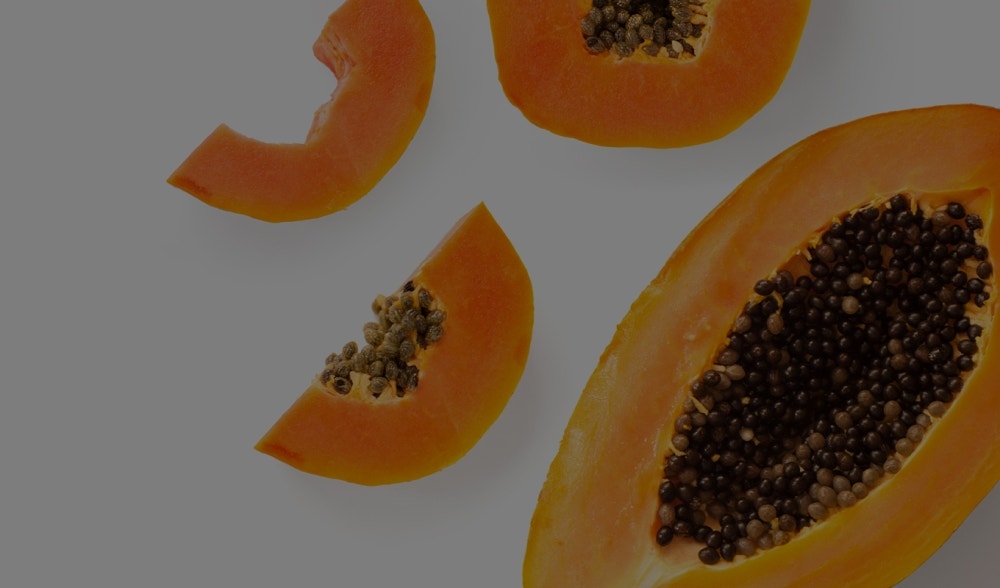1. What is the history of papaya?
The papaya plant is native to the tropical areas of Central America, there are more than 20 different species and the first news about it dates back to 1519, where it is mentioned in the travel stories of a certain Hernan Cortés. Cortés was extremely warmly welcomed by the Aztecs. The natives prepared a sumptuous banquet in which they were offered strange melon-like fruits which, it seemed, helped to digest.
However, the Aztecs were not the only ones who knew the properties of papaya. Australian Aborigines also knew about it and had been using it for centuries. Explorers such as Christopher Columbus, Marco Polo, Vasco da Gama, Magellan on their return home from long trips to the most exotic lands, reported wide use of papaya among the different populations with which they came into contact.
2. How is fermented papaya made?

The papaya fermentation process involves ripe but still green fruits, to obtain the maximum of bioactive principles and enzymes and enhance all its beneficial properties. For fermentation, pulp, seeds, peel, papaya leaves fermented together with green tea, fresh lemon juice and a particular yeast, kombucha, are used. The pool of beneficial substances that are obtained from this 100% assimilable compound (due to fermentation, which is a form of pre-digestion) is an extraordinary natural touch that is difficult to match.
3. Fermented papaya: beneficial properties
The fame of fermented papaya in the world of nutraceuticals was born in the late 80s by the famous French immunologist Luc Montaigner, who notes its immunostimulating and antioxidant effects.
Today the fermented papaya has become one of the most used food supplements by antiaging medicine due to its potential contrasting effect on oxidative stress.
"Papaya is one of the major sources of antioxidants and we recently learned that antioxidants play a very important role in protecting the body ... We have compared five different types of fruit and two different types of vegetables and we have found that the papaya, a tropical fruit ... is one of the richest sources of antioxidants, twenty times more powerful than vitamin E. "
Professor Luc Montagnier (Paris, October 26, 2000)
The properties of fermented papaya derive from the very high concentration of numerous enzymes, essential biocatalysts to bring about the physiological reactions for life (not only for the digestive processes!), Mineral salts and vitamins that have a very powerful antioxidant activity and more.
The unripe fruit of the papaya contains many more enzymes than the ripe one and among these the most important are papain, chymopapain, and papialisozime. In addition to these enzymes, in the papaya Phyto complex, we find in a highly bioavailable form significant quantities of antioxidants such as:
- Selenium
- Vitamin E
- C vitamin
- Provitamin A
- High quantity carotenoids (lycopene and B-cryptoxanthin)
- Flavonoids,
- Riboflavin (Vitamin B2), niacin (B3), thiamine (B1)
- Mineral salts and trace elements such as calcium, phosphorus, iron, magnesium, potassium
4. Benefits of fermented papaya according to research

- Antioxidant: recent studies confirm the potential invigorating effects due to the high concentration of elements with high antioxidant power and enzymes. We must also consider that contemporary nutrition is often low in vitamins, minerals, enzymes, and that cooking and storing foods further deplete them. Hence the importance of taking the correct supplements.
- Immunostimulant: fermented papaya is often recommended to strengthen the immune system and help the body defend itself from external aggressions, especially in the change of seasons when flu, bacteria, and viruses spread and in periods of high stress.
- Prevention of ailments: fermented papaya seems to reduce the incidence of some degenerative cardiovascular and skin diseases. Flavonoids also regulate the permeability of blood vessels, promoting microcirculation and blood circulation in general, offering greater vasoprotection.
- Digestive: traditionally known as an excellent digestive tonic, papaya is a type of proteolytic enzyme, that is, it favors a rapid "dismantling" and digestion of proteins. This means that, in addition to improving digestion, it counteracts the formation of waste substances in the body.
5. Fermented papaya: contraindications to keep in mind
It should be avoided during pregnancy and lactation since there are no studies that prove its safety in these delicate periods. Dried papaya increases iron absorption and should, therefore, be avoided if iron supplements are taken. Finally, pay attention to the interaction with some drugs: always seek the advice of a doctor to avoid any unpleasant side effects.
Have you ever tried fermented papaya? Let us know what you think in the comments!


Comments
Write a comment about the article